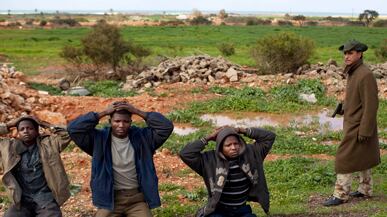Yusuf Suleiman Hassan, a 25-year-old native of Chad, says he came to Benghazi, in eastern Libya, six months ago to find work. He eventually joined dozens of his countrymen in grueling construction work. When the violent uprisings broke out in Libya last month, he knew it was time to go. "There was a lot of fighting," says Hassan, who's wearing a muddy light blue jacket and brown sandals. "I'm a poor man and I just want to go home."
The Kalashnikov-toting Libyan guards who are now holding Hassan captive don't buy any of it. They insist he's a murtazeqa—a mercenary paid by Muammar Gaddafi to attack regime opponents. Hassan wasn't detained with any weapons, but the guards did find something they claim proves his real identity: an ID card from the Patriotic Salvation Movement, the political party of Chad's president, Idriss Deby. Gaddafi has long supported Deby in Chad's cutthroat political scene. The yellow ID card is emblazoned with the party motto, "Dying for Salvation," in French and Arabic and notes that the card was issued through the "Benghazi cell." "This card is proof that he's a murtazeqa," says Hassan Musa, 44, a former Army lieutenant colonel watching over him. "He doesn't have a passport or any other ID. He was sent here to attack Libyan people."

The reality is hardly that clear-cut. But mention the word murtazeqa in "Free Libya," the eastern portion of the country now out of Gaddafi's control, and a heated conversation is sure to follow.
Foreign mercenaries are blamed for some of the worst violence against Libyan demonstrators in recent weeks and videos posted on YouTube allegedly show these mercenaries wearing yellow hardhats and attacking civilians with pistols and sticks. Bumper stickers have even been printed that say "No to the murtazeqa," beside a silhouette of a man wearing a yellow hardhat. "There's pretty strong evidence that Gaddafi brought in foreign fighters," says Peter Bouckaert, emergencies director for Human Rights Watch. But they're not conventional mercenaries, he explains. "Gaddafi has been supporting militia movements in Africa for a long time. They have training camps here."
“I’m a poor man and I just want to go home”—a suspected mercenary.
The problem is that the fear of foreign mercenaries has spurred hysteria among Libyans in the east and led to a series of attacks on dark-skinned Africans who had nothing to do with the violence. A near-riot broke out outside the Benghazi courthouse last week when a rumor started that a detained mercenary was being brought out of the building. "Unfortunately these kinds of xenophobic attacks have happened in Libya before," says Bouckaert.
Many of the cases of alleged mercenaries are as murky as that of Hassan, who was detained with 45 other dark-skinned Africans on Saturday night. The men, who are mostly from Chad, along with a few Sudanese, were packed into a white, open-topped truck and driven southbound from Benghazi toward the Chad border shortly after sunset. About 30 minutes drive south of Benghazi, their truck broke down. A police patrol from the nearby town of Gemaynis came across the truck on the highway and detained the entire group.
This afternoon, the 46 detainees were crowded into a corner on the second floor of the Gemaynis police station as local cops talked excitedly amongst themselves. One side of the room was piled up with carpets, blankets, clothes, and suitcases belonging to the detainees. The room reeked of sweat and many of the detainees looked anxious. The police had searched all the men and their belongings but didn't find any weapons.
A handful of the men from the group say the truck trip was organized by a commercial transport company in Benghazi and that they had never met the other passengers before the trip last night. Abu Bakr Yahya, 41, a Khartoum resident, says he had been working in a furniture construction business in Benghazi for the past year. He had been biding his time until the situation in the city calmed down in order to make his way back to Sudan. "Everybody wants to leave because of the situation," says Yahya, who's sporting a white jacket with a hood. "I don't know any of these people and now I'm stuck with them."
The majority of the detainees from Chad came from the city of Atia and had been working in construction together, a couple of the Chad natives said. Hardly any members of the group had a passport or any other form of ID and only one other member of the group had an ID from the Patriotic Salvation Movement. He refused to be interviewed. For his part, Hassan, a soft-spoken man with a large tribal scar on his forehead, says he was given the party ID in Benghazi but did not know what it was all about. "If I knew this ID would cause a problem, I wouldn't carry it," he says. Hassan also flatly denies any involvement in military activities or the violent crackdown against demonstrators.
"I never even carried a weapon in Chad," he says.
Despite their suspicions about the group, the commanders at the Gemaynis police station said the case would be handled properly and the men would be sent back to Benghazi. "Some of them are afraid they're going to be shot or they're going to die," says Musa, the lieutenant colonel. "But we're going to hand them over to the National Council [the de-facto government in Benghazi] and they're going to follow up."
Babak Dehghanpisheh is Newsweek's Beirut bureau chief. He's been covering the Middle East for Newsweek since 2001.






